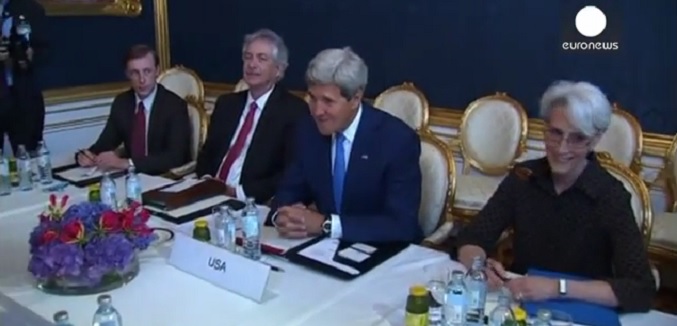The Daily Beast on Monday assessed that the easing of sanctions on Tehran, as reported in a newly released study by Roubini Global Economics and the Foundation for Defense of Democracies (FDD), has allowed the Iranian economy to begin to recover, “undercutting Western leverage” ahead of the July 20 deadline to reach an agreement over the Islamic republic’s nuclear program. FDD Executive Director Mark Dubowitz had already in May expressed concerns that eroding leverage may prevent American diplomats from securing “[a]n agreement that is verifiable, enforceable and that prevents Iran from pursuing both a uranium and a plutonium pathway to a nuclear weapon would be a tremendous achievement.” Secretary of State John Kerry met over the weekend with Iranian Foreign Minister Mohammed Javad Zarif in Vienna, a week ahead of the expiration of the interim Joint Plan of Action (JPA):
Mr. Kerry said he was evaluating the process to determine whether to recommend to Mr. Obama that the talks be extended beyond the July 20 deadline. “Obviously, we have some very significant gaps still,” he said. “It is vital to make certain that Iran is not going to develop a nuclear weapon, that their program is peaceful.” Though Mr. Kerry is not talking about extending the talks — which is permitted under an interim agreement reached in November — that now seems inevitable.
The Daily Beast attributed “loosening pressure on Iran’s economy” to observer skepticism that a breakthrough will come in Vienna. The Obama administration had at the onset of the JPA claimed that the overall value of the relief offered by the agreement would be modest – roughly $7 billion – and that the rest of the international sanctions regime would hold. Skeptics challenged the claims, among other things predicting that a feeding frenzy would take hold as sanctions were modestly eroded, with nations and companies scrambling to avoid getting left behind in the rush back into Iran’s markets. The Daily Beast conveyed details from the Roubini/FDD study indicating that Iran’s GDP is expected to grow as a result of the loosened sanctions:
Dubowitz and analysts from the Roubini Group—the consultancy formed by the often-prescient, sometimes controversial economist Nouriel Roubini—concluded for example that Iran’s GDP in 2014 and 2015 is expected to grow at 2 percent. That’s only modest growth—but it’s a huge improvement over Iran’s economic performance the 2012/2013 fiscal year, when GDP contracted by 6.6 percent. Inflation is also beginning to go down. The first quarter of 2014 saw the rate of inflation dip below 20 percent, still a worrisome number, but less than half the rate of inflation for Iran in early 2013 when it was at 45 percent. By the end of 2012, 40,000 Iranian Rial was worth one dollar. As of June, it’s now 33,000 Rial to the dollar.
[Photo: euronews / YouTube]




